- Home
- Amy Harmon
What the Wind Knows Page 7
What the Wind Knows Read online
Page 7
“Brigid Gallagher.”
“Brigid Gallagher,” I breathed. “That’s right.” Brigid Gallagher. Eoin’s grandmother. Declan Gallagher’s mother. Anne Gallagher’s mother-in-law. Anne Gallagher.
Thomas Smith had called me Anne.
“Thomas says you’re my mother. I heard him tell Nana,” Eoin said in a rush, and I gasped, the hand I’d raised to touch him falling back to the bed. “Is my da comin’ back too?” he pressed, not waiting for my reply.
His father? Oh God. This was Eoin. This was my Eoin. Just a child. And his mother and father were dead. I was not his mother, and neither of them were coming back. I put my hands over my eyes and willed myself to wake up.
“Eoin!” The woman’s call came from somewhere else in the house, seeking, searching, and the little boy was gone in a flash, racing to the door and slipping out of the room. The door shut carefully, quietly, and I let myself fall away into another dream, a safe darkness, where grandfathers didn’t become little boys with crimson hair and winsome smiles.
When I awoke again, there were hands on my skin, and the bedcovers were pushed aside, baring my abdomen while my bandages were changed.
“It will heal quickly. It made a furrow in your side, but it could have been far worse.” It was the man from the pictures again. Thomas Smith. He thought I was someone else. I closed my eyes to keep him away, but he didn’t leave. His fingers danced around my denial, steady and sure. I started to panic, my breaths coming in short gasps.
“Are you hurting?”
I whimpered, more afraid than in pain. I was terrified of giving myself away. I was not the woman he thought I was, and more than anything, I was suddenly, desperately afraid to tell him he’d made a terrible mistake.
“You’ve been asleep so long. You’ll have to talk to me sometime, Anne.”
If I talked to him, what would I say?
He gave me a spoonful of something clear and syrupy, and I wondered if laudanum was responsible for my hallucinations.
“You saw Eoin?” he asked.
I nodded and swallowed, recalling the image of the little boy with his vivid hair and familiar eyes peeking at me through the brass footboard. My mind had created such a beautiful child.
“I told him not to come in here,” he sighed. “But I can’t really blame the lad.”
“He’s exactly the way I pictured him.” I said this softly, slowly, concentrating on saying the words the way my grandfather would have said them, the soft burr something I could imitate, something I had imitated, all my life. But it felt false, and I winced even as I tried to deceive Thomas Smith with the accent. The words were true. Eoin was just as I’d pictured. But I was not his mother, and none of this was real.
When I awoke again, my head was much clearer, and the colors that had swum in deep burgundy and orange in the firelight now remained still, within concrete lines and solid shapes. Light was gathering—or going?—beyond the glass of the two tall windows. The night had faded, but the dream continued.
The fire in the grate and the little boy with my grandfather’s name were both gone, but the pain was sharper, and the man with the gentle hands remained. Thomas Smith slumped in a chair, as if he’d fallen asleep watching me. Once, I had studied him in black and white as he stared up at me from an old photograph, and I did so again, telling myself there was no danger in my delusions. The shadows of the room added little color to the man. The hue of his hair—dark—was unchanged from the photograph, but the slicked-back waves from yesteryear had fallen over deep-set eyes I knew to be blue, the only color separate from the fog. His lips were softly parted, and their forgiving shape and gentle slope tempered a chin that was too square, a face that was too thin, and cheekbones that were too sharp.
He wore the clothes of a much older man—high-waisted trousers topped with a fitted vest secured over a flat torso. A pale, collarless dress shirt was buttoned to his throat. His sleeves were rolled to his elbows, and his feet in black wingtips were firmly planted, as though he’d drifted off expecting to be immediately reawakened. He looked long and angular in the high-backed chair, limbs loose and dangling, wrists and fingers pointed toward the floor, an exhausted warrior king asleep on his throne.
I was thirsty, and my bladder was full. I eased to my left and attempted to push myself up, gasping at the fire in my side.
“Careful. You’ll reopen your wound,” Thomas protested, his voice rough with sleep and soft with Ireland. The chair squeaked as I heard him rise, but I ignored him, feeling the covers fall from my shoulders even as I braced myself and held the sheet to my breasts. Where were my clothes? I was turned away from him, my back was bare to his view, and I heard him approach and stop beside the bed.
He held a glass of water to my lips, and I drank gratefully, shakily. His hand was at my back, warm and solid.
“Where have you been, Anne?”
Where am I now?
“I don’t know.” It was a whisper. I didn’t look at him to gauge his reaction. “I don’t know. I just know that I’m . . . here.”
“And how long will you be here?” His voice was so cold that my fear grew, filling my chest and making my limbs numb and my fingertips pulse.
“I don’t know that either,” I said.
“Did they do this to you?” he asked.
“Who?” The word was a wail in my head but a sigh on my lips.
“The gunrunners, Anne.” It was his turn to whisper. “Were you with them?”
“No.” I shook my head adamantly, the room swimming with the movement. “I need to use the restroom.”
“The restroom?” His voice rose, puzzled.
“The toilet? The loo?” I searched my memory for the Irish terminology.
“Hold on to me,” he instructed, leaning over me and sliding his arms beneath me. I grappled with the sheet and didn’t hold on to him at all, struggling to remain covered as he straightened, hoisting me as he did.
He carried me from the room, down a narrow hallway, and into a bathroom, setting me down carefully on the toilet. The tank was high on the wall, connected by a long brass pipe to the perfectly round seat. The space was spotless and white; the pedestal sink and claw-foot tub with heavy rounded curves gleaming and proud. I was ridiculously relieved that he hadn’t had to traipse through the house and out into the yard to an outhouse or that I hadn’t had to squat over a chamber pot. At the moment, squatting was out of the question.
Thomas left without a word, clearly confident I could handle the rest by myself. He was back, tapping softly, a few minutes later, and I opened the door to him, catching our reflections in the little mirror above the basin before he swept me up again, careful, his eyes clashing with mine in the glass. My hair was a curling mess, flatter on one side than the other, and my eyes were hollow beneath the tepid green. I looked terrible, and I was too exhausted to care. I was almost asleep before he laid me back on the bed and pulled the covers over me.
“Five years ago, I found Declan. But I didn’t find you,” he said, as if he couldn’t stay silent any longer. “I thought you and Declan were together. I was evacuating the wounded from the GPO to Jervis Street. Then the fire was too great, and the barricades were up, and I couldn’t get back.”
I lifted my concrete lids and found him watching me, his expression desolate. He scrubbed at his face as though he could wipe the memory away. “When the fires consumed the GPO, everyone abandoned it. Declan . . .”
“The GPO?” I was so tired, and the question slipped out.
He stared at me, his brow furrowed. “The post office, Anne. Weren’t you and Declan with the Volunteers at the post office? Martin said he thought you evacuated with the women, but Min said you turned back. She said you insisted on being with Declan to the end. But you weren’t with Declan. Where did you go, Anne?”
I didn’t remember, but I suddenly knew. The Easter Rising. He was describing events I’d read about in considerable detail.
“It was a battle we weren’t going to win,
” Thomas murmured. “We all knew it. You and Declan knew it. We talked about what revolution would mean, what it meant to even fight back. There was something glorious about it. Glorious and terrible.”
“Glorious and terrible,” I whispered, picturing it, wondering again if I’d conjured this scene the way I’d imagined stories as a child, putting myself in the very center of the action and losing myself in my own productions.
“The day after we withdrew from the GPO, the leadership surrendered. I found Declan lying in the street.” Thomas gazed at me, watching my face as he spoke of Declan, and I could only stare back helplessly. “He wouldn’t have left you in the GPO, and the Anne I knew wouldn’t have left him at all.”
The Anne I knew.
Fear, sour and hot, churned in my stomach. I didn’t like this development in the story. They had never found Eoin’s mother. They’d never found her body. They had assumed she was dead, alongside her husband, lost in an insurrection that had ended very badly. And now I was here, raising questions that were long since buried. This was bad. This was very bad.
“We would have known. If you’d been sent to England with the other prisoners, we would have known. They released the other women. Everyone has been released. Years ago. And . . . and you’re well!” Thomas insisted. He turned away, shoving his hands into the pockets of his trousers. “Your hair . . . your skin. You look . . . well.”
My good health was an accusation, and he threw the words at me, although he never raised his voice. He turned back toward me but didn’t approach the bed.
“You look well, Anne. You definitely haven’t been wasting away in an English prison.”
There was nothing I could say. No explanations I could give. I didn’t know what had happened to the Anne Gallagher of 1921. I didn’t know. The image of the graves in Ballinagar rose in my mind, a tall stone with the name Gallagher at the base. Anne and Declan shared that stone, and the dates had been clear: 1892 to 1916. I’d seen it yesterday. I was dreaming. Only dreaming.
“Anne?” Thomas pressed.
I was a wonderful liar. Not because I was deceitful, but because my mind could immediately conjure variations and plot twists, and any lie became an alternate version of a tale. I didn’t especially like that I was so skilled but considered it an occupational hazard. I couldn’t lie now. I didn’t know enough to create a convincing story. Not yet. I would go to sleep, and when I woke, this would be over. I gritted my teeth and closed my eyes, blocking it all out.
“I don’t know, Thomas.” I used his name, a plea to let me be, and turned my head toward the wall, needing the safety of my own thoughts and the space to examine them.
8 September 1917
Garvagh Glebe means “rough place.” I’ve always thought that an interesting name for such a beautiful spot, as the land sits next to the lough, and the trees are tall, the soil rich, and the grass green. The land isn’t a rough place. Yet for me, that is exactly what Garvagh Glebe has always represented. A rough place. A hard spot. And I’ve always struggled between loving her and resenting her. She belongs to me now, but she was not always mine.
She belonged to John Townsend, my stepfather, an English landowner whose family had been granted the land on the lough three hundred years before his birth. John was a kind man. He was good to my mother, good to me, and when he died, I inherited it. An Irishman. For the first time in three hundred years, the land had returned to Irish hands. I’d always believed that Irish land should be owned by Irish men and women, by the people who had lived and died in the soil generation after generation.
But the knowledge did not stir pride or vindication within me. Instead, contemplating Garvagh Glebe and the fates that had smiled on me usually filled me with quiet desperation. To whom much is given, much is expected, and I expected a great deal of myself.
I did not blame John Townsend for his Englishness. I loved him. He had carried no ill opinions or intentions, no biases against the Irish, no hate in his heart. He was simply a man who received what he’d been given. The taint on his inheritance had faded with the centuries. He felt no guilt for the sins of his fathers. And he shouldn’t. But the history was not lost on me.
I supposed I was no different than my stepfather. I’d benefitted from his wealth. I’d happily taken what I’d been given. He provided an excellent upbringing and brought in the best doctors and tutors when I was young and ill. He paid for my advanced education when I grew older, for the fine house in Dublin where I’d lived to attend medical school at the University College, Dublin. He’d purchased the car to take me back home when my mother died halfway through my second year. And when my stepfather died six months before the Rising, he left everything he owned to me. I had not made the money I’d invested in the London Stock Exchange. I hadn’t worked for the funds that sat in the Royal Bank on Knox Street or the bank notes that filled the safe in the library at Garvagh Glebe. The accounts all bore my name, but it wasn’t money I’d earned.
I could have walked away in protest, rejecting John Townsend’s wealth and his kindness. But I was not a fool. I was an idealist, a nationalist, a proud Irishman, but I was not a fool. I’d promised myself as a boy of fifteen sitting in a classroom in Wexford, listening to my teacher read Speeches from the Dock, that I would use my education, position, and good fortune to better Ireland. Those were the days when Declan was always at my side, just as passionate and just as committed to the cause of Irish freedom as I was. John Townsend’s money had paid for Declan’s education too. My stepfather had wanted me to live among friends, and he had paid Declan’s room and board, arranged for his trips back home to see his mother, and years later, when Declan had married Anne, he even paid for the wedding and let the couple live in the overseer’s cottage on Garvagh Glebe, rent-free.
John Townsend had not approved when Declan and I became involved in the local branch of Sinn Féin or when we joined the Irish Republican Brotherhood. But he’d never withdrawn his funds or his affection. I wonder now that the walls of Garvagh Glebe no longer echo with his voice if we hurt him in our fervor. I wonder if our rhetoric of unjust British rule and bloody Englishmen ever made him wilt and walk away. The thought causes me great remorse. I have had to come to terms with the fact that idealism often rewrites history to suit her narrative. The truth is, the English are not all tyrants, and the Irish are not all saints. Enough blood has been spilt, enough blame has been cast, to condemn us all.
But Ireland deserves her independence. I am not as fiery or fierce as I once was. I am not as naïve or blind. I’ve seen what revolution costs, and the price is dear. But when I look at Eoin and see his father, I still feel the longing in my belly and the promise in my bones.
T. S.
6
A DREAM OF DEATH
I dreamed that one had died in a strange place
Near no accustomed hand,
And they had nailed the boards above her face,
The peasants of that land.
And left her to the indifferent stars above
Until I carved these words:
She was more beautiful than thy first love,
But now lies under boards.
—W. B. Yeats
I’d seen a documentary once on a nightly news program about a woman who had woken up in her own home one morning, clueless as to how she’d gotten there. She didn’t know her children or her husband. She didn’t know her past or her present. She’d walked through the hallways and the rooms of her home, looking at the pictures of her loved ones and her life and staring at her unfamiliar face in the mirror. And she decided to fake it. For years, she didn’t let on that she couldn’t remember anything before that day. Her family had never guessed her secret until she’d tearfully confessed years later.
Doctors believed she’d had some sort of aneurism, some health issue that had affected her memory but left her otherwise whole. I had watched the program with great skepticism—doubting not that she’d forgotten but that she’d been able to pull such a thing off wi
thout her family realizing something was terribly wrong.
For three days, I lay in discomfort and denial, sleeping when I could and staring at the flowered walls when I could not. I listened to the house and begged it to take me into its confidence, to reveal the secrets I didn’t know and to confess the details I should know, the pieces that were scattered like bits of paper in the wind, impossible to recapture. With all the innocent ambivalence of a child, I hadn’t thought to ask Eoin about his early life. Growing up, I was immersed in the world he built for me—a world that was filled with all the accoutrements of childhood. I was the center of his universe. I had never thought about the time before, when he had existed separate from me, without me. But he had. And I realized how little I knew of that life.
There were moments I wept in fear, pulling the blankets up over my face to hide and tremble beneath a comforter that should not—did not—really exist. These people—Thomas, Brigid, Eoin—they didn’t exist. Not anymore. Yet here they were, as alive as I was, flesh and bone and feelings, moving through days that were already past. And then the tears would begin again.
I was half convinced I was dead, that I’d died on the lake and gone to a strange heaven where Eoin existed as a child again. Ultimately, that was the thought that glimmered and grew, a spark that became a flame, warming me and calming the crazed circling of my thoughts. Eoin was here, in this place. In my world, he was gone. Here, we were together again, just like he’d promised we would be. Eoin made me want to stay, if only for a while.
Thomas checked on me frequently, changing my bandages and checking for infection. “You’ll be fine, Anne. Sore. But fine. No serious damage was done.”
“Where’s Eoin?” I asked. The boy had not been in to see me since that first night.
“Brigid has gone to her sister’s in Kiltyclogher for a few days.”
“Kiltyclogher,” I repeated, trying to remember where I’d heard it before. “Seán Mac Diarmada was born in Kiltyclogher,” I said, pulling the factoid from the recesses of my mind.

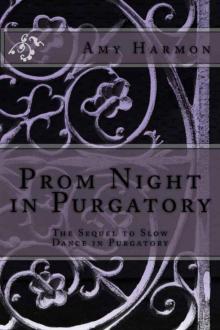 Prom Night in Purgatory
Prom Night in Purgatory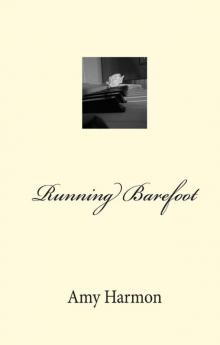 Running Barefoot
Running Barefoot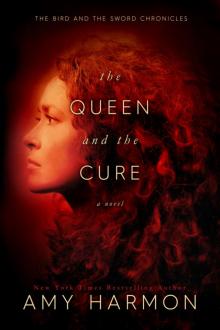 The Queen and the Cure
The Queen and the Cure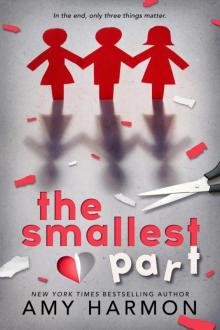 The Smallest Part
The Smallest Part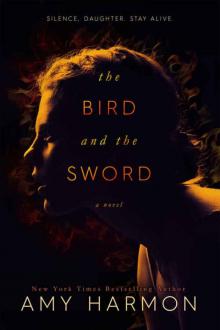 The Bird and the Sword
The Bird and the Sword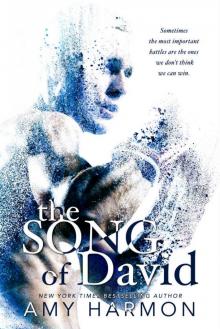 The Song of David
The Song of David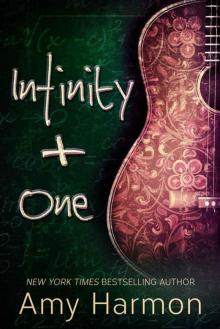 Infinity + One
Infinity + One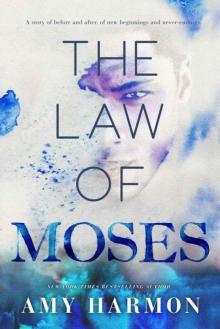 The Law of Moses
The Law of Moses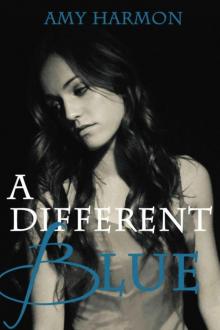 A Different Blue
A Different Blue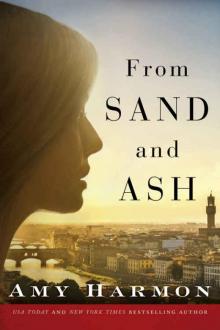 From Sand and Ash
From Sand and Ash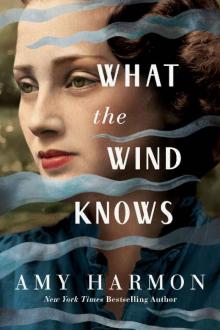 What the Wind Knows
What the Wind Knows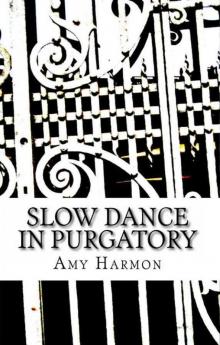 Slow Dance in Purgatory
Slow Dance in Purgatory Romance Through the Ages
Romance Through the Ages